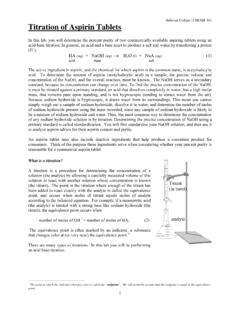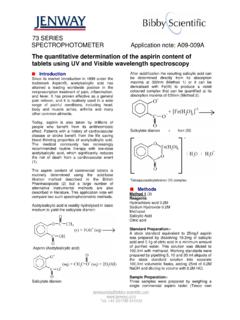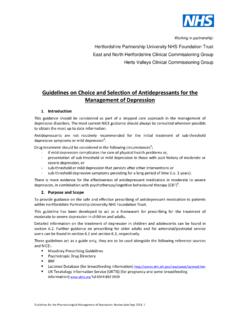Transcription of Guidelines on Choice and Selection of Antidepressants for ...
1 Guidelines for the Pharmacological Management of Depression: Review date Sept 2018 1 Guidelines on Choice and Selection of Antidepressants for the Management of Depression 1. Introduction This guidance should be considered as part of a stepped care approach in the management of depressive disorders. The most current NICE guidance should always be consulted wherever possible to obtain the most up to date information. Antidepressants are not routinely recommended for the initial treatment of sub-threshold depressive symptoms or mild depression6. Drug treatment should be considered in the following circumstances6; - if mild depression complicates the care of physical health problems or, - presentation of sub-threshold or mild depression in those with past history of moderate or severe depression, or - sub-threshold or mild depression that persists after other interventions or - sub-threshold depressive symptoms persisting for a long period of time ( 2 years).
2 There is more evidence for the effectiveness of antidepressant medication in moderate to severe depression, in combination with psychotherapy/cognitive behavioural therapy (CBT)6. 2. Purpose and Scope To provide guidance on the safe and effective prescribing of antidepressant medication to patients within Hertfordshire Partnership University NHS Foundation Trust. This guideline has been developed to act as a framework for prescribing for the treatment of moderate to severe depression in children and adults. Detailed information on the treatment of depression in children and adolescents can be found in section Further guidance on prescribing for older adults and for antenatal/postnatal service users can be found in section and section , respectively. These Guidelines act as a guide only, they are to be used alongside the following reference sources and NICE:- Maudsley Prescribing Guidelines Psychotropic Drug Directory BNF Lactmed Database (for breastfeeding information) UK Teratology Information Service (UKTIS) (for pregnancy and some breastfeeding information) Tel 0344 892 0909 Guidelines for the Pharmacological Management of Depression: Review date Sept 2018 2 3.
3 Recommended Pharmacological Treatment for Depression Pharmacological Treatment of Depression in Adults FIRST LINE SSRI - Citalopram, Fluoxetine or Sertraline SECOND LINE Alternative SSRI or Venlafaxine or Mirtazapine THIRD LINE Alternative 2nd line agent (see above) Consider vortioxetine* or other options (MAOI, TCA) Consider a combination of two different Antidepressants Consider augmentation with an antipsychotic or lithium With appropriate physical health monitoring SSRIs potentially interact with concomitant medication or physical illness (see section 5 below) For specialist initiation only Patients under 18 years Fluoxetine is the recommended first line treatment in patients under 18 years7. It is licensed for the treatment of moderate to severe depression from 8 years onwards. See section ,7 There is a risk of a dose dependant QT prolongation with citalopram, do NOT prescribe in patients with known QTc prolongation, congenital long QT syndrome or in those with medications that are known to prolong QTc.
4 Older Adults >65 years Recommend monitoring for antidepressant induced hyponatraemia. Increased risk of GI bleeding. See section ,6 Antenatal and Postnatal Prescribing SSRIs have low known risk, most experience with fluoxetine and sertraline. TCAs also have low teratogenic risk. Imipramine, nortriptyline and sertraline considered safest in breastfeeding. See section ,8,10 *Refer to prescribing notes, page 8 Guidelines for the Pharmacological Management of Depression: Review date Sept 2018 3 4. Pharmacological Treatment for Depression Basic principles of prescribing in depression5; Discuss with the patient Choice of drug and availability of other non-pharmacological treatments. Discuss with the patient likely outcomes, such as gradual relief from depressive symptoms over several weeks. Prescribe a dose of antidepressant (after titration, if necessary) that is likely to be effective. For a single episode, continue treatment for at least 6-9 months after resolution of symptoms (those at risk of relapse should continue for at least 2 years).
5 Withdraw Antidepressants gradually; always inform patients on the risk and nature of discontinuation symptoms. Choice of antidepressant5,6; Consider a baseline assessment for severity of depression and regularly review symptoms both clinically and using a standard severity rating scales. Initially normally choose a generic SSRI whilst taking the following into account; Fluoxetine, fluvoxamine and paroxetine have the higher propensity for drug interactions (fluvoxamine and paroxetine are the least preferred SSRI s). It may be appropriate to consider sertraline and citalopram in patients who have chronic health problems, as these have a lower propensity for interactions with medications for physical health. SSRI s are associated with an increased risk of bleeding consider prescribing a gastro-protective drug ( omeprazole) in older adults who are taking NSAIDs and/or aspirin . Discuss Choice of antidepressant , covering; Patient Choice , the perception of the efficacy and tolerability.
6 Existing co-morbid psychiatric disorders such as obsessive compulsive disorder, anxiety etc., through accurate history taking. Anticipated adverse events, agitation, nausea and vomiting with SSRIs, and discontinuation symptoms. See appendix 1 for table of relative side effects of Antidepressants . Potential interactions with concomitant medication or physical illness5,11; Medication for physical health problem Recommended antidepressant (s) NSAIDs (non-steroidal anti-inflammatory drugs) Try to avoid SSRI s but if no suitable alternatives can be identified, offer gastro-protective medicines ( omeprazole) together with the SSRI5,11. Consider mirtazapine, moclobemide or trazodone. Warfarin or heparin Do not normally offer SSRI s5,11. Consider mirtazapine. Theophylline or methadone Offer citalopram or sertraline (sertraline may increase methadone levels). Clozapine Consider citalopram or sertraline (small to modest increases in plasma clozapine levels may occur, particularly with sertraline) 2, 16.
7 Triptan drugs for migraine Do not offer SSRI s, offer mirtazapine or trazodone. aspirin Use SSRI s with caution, if no suitable alternatives can be identified, offer gastro-protective medicines together with the SSRI. Consider trazodone when aspirin is used as a single agent, alternatively consider mirtazapine. Monoamine-oxidase B inhibitors, selegiline or Do not normally offer SSRI s, offer mirtazapine or trazodone. Guidelines for the Pharmacological Management of Depression: Review date Sept 2018 4 rasagiline Flecainide or propafenone Offer sertraline as the preferred antidepressant , mirtazapine or moclobemide may also be used. Switch treatments early ( after 1-2 weeks) if adverse effects are intolerable or if no improvement at all is seen by 3-4 weeks. Antidepressants have a fairly prompt onset of action and non-response at 2-6 weeks is a good predictor of overall response. See Appendix 2 for table of swapping and stopping advice taken directly from the Maudsley Prescribing Guidelines 12th Edition5.
8 The absence of any improvement at all at 3-4 weeks should normally provoke a change in treatment. If there is some improvement at this time, continue and assess for a further 2-3weeks. For advice on switching treatments please refer to the Psychotropic Drug Directory4, The Maudsley Prescribing Guidelines5 or contact the pharmacy team for advice. Guidelines for the Pharmacological Management of Depression: Review date Sept 2018 5 5. HPFT Formulary Drugs for the treatment of Depression in Adults1,5 Drug Drug Class Formulation Additional Prescribing Information Amitriptyline Tricyclic antidepressant (TCA) 10mg, 25mg and 50mg tablets 25mg/5ml and 50mg/5ml oral solution Consider TCAs in patients presenting with pain and physical symptoms. Avoid in patients at risk of arrhythmias. Consider ECG at higher dose or when co-administered with other drugs that may increase the risk fluoxetine. Increased cholinergic burden, especially when co-prescribed with other anticholinergic drugs.
9 Citalopram Selective serotonin reuptake inhibitor (SSRI) 10mg, 20mg, 40mg tablets 40mg/ml oral drops (1 drop=2mg) 4 drops (8mg) = 10mg tablet SSRI with lowest propensity for drug interactions. Suitable Choice in renal impairment. Citalopram: QT interval prolongation new maximum daily dose restrictions (including in elderly patients), contraindications, and warnings. Citalopram most toxic of SSRI s in overdose (coma, seizures, arrhythmia)5. Contraindicated with other QT prolonging medications. Baseline ECG advised in patients with cardiac disease. Clomipramine TCA 10mg, 25mg and 50mg capsules As for amitriptyline. Duloxetine Serotonin and noradrenaline reuptake inhibitor (SNRI) 30mg and 60mg capsules Second line SNRI only after venlafaxine. Fluoxetine SSRI 20mg capsules 20mg/5ml oral liquid (can also be used sublingually) 60mg capsules NOT approved. Good option for patents with poor medication compliance due to its long half-life. Imipramine TCA 10mg and 25mg tablets 25mg/5ml oral solution As for amitriptyline.
10 Lofepramine TCA 70mg tablets As for amitriptyline. Guidelines for the Pharmacological Management of Depression: Review date Sept 2018 6 70mg/5ml oral suspension Lower incidence of side-effects and less dangerous in overdose. Less cardiotoxic than other TCAs. It is an option in SSRI induced hyponatraemia. Can cause raised liver function tests. Mianserin Tetracyclic antidepressant 10mg tablets and 30mg tablets For specialist initiation only in line with NICE CG 90 (for combining with an another antidepressant ). Mirtazapine Noradrenaline and specific serotonin antidepressant (NaSSa) 15mg, 30mg and 45mg tablets and orodispersible tablets 5mg/ml oral solution Oral solution should only be used when orodispersible tablets are unsuitable. Safer option in patients at high risk of GI bleed older adults + NSAIDs. Consider if SSRI has not benefited or SSRI not appropriate. Good Choice if sedation required. Moclobemide Reversible Monoamine oxidase inhibitor (MAOI) 150mg and 300mg tablets For specialist initiation only.







